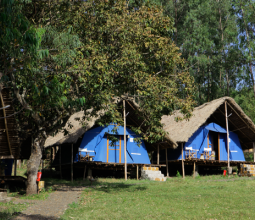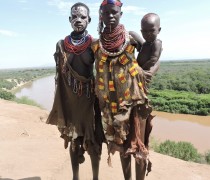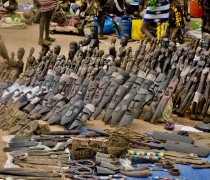A Great Lodge, Homestay In The Southern Region
Eco-Omo Lodge, Jinka
Eco-Omo Lodge, Jinka Offers:
Lodging Type: Lodge, Homestay
Dining: Ethiopian
Facilities: Showers - Bucket / Bush, Showers - 24hr hot water
Eco & Green: Community Development Projects
Activities:
- Traditional tribes
- Markets
Price range:
Under 50 USD
About Eco-Omo Lodge, Jinka
In the heart of the Omo Valley, just outside Jinka, Eco-Omo Lodge is an eco-friendly lodge made up of safari tents.
The 20 en-suite safari tents are made up of twins and doubles. All rooms are raised on stilts and have thatched roofs. There are also 8 rooms with shared showers and loos, and a campsite with an adjoining bathroom block. The restaurant has a bar and terrace, and the lodge also has TV, gift shop, and Wifi. Cultural dances by the Ari and the Mursi peoples can be organised on request.
The Konso people live in traditional walled towns. They dress in woven dress and live according to a wealth of local traditions. The town of Konso is a maze of stone walls, with community houses for men and boys, and local culture such as a swearing stone, and coming of age traditions, and unusually engraved wooden statues that they use as grave markers. They also mummify their emperors. The Konso people are also known for their impressive terracing of the land, which has contributed to the recognition of the region as a UNESCO World Heritage Site.
Activities include visiting the walled town of Konso, and stopping at the local markets where the Konso people socialise, and buy and sell their goods.
Reservations & Enquiries
To find out more, or request a quotation, add Eco-Omo Lodge, Jinka, to your list of favourites.
Accommodation In The Southern Area
- Aregash Lodge, nr Hawassa
- Bale Mountain Lodge, Bale Mountain National Park
- Buska Lodge, Turmi
- Central Hawassa Hotel, Hawassa
- Dorze Lodge, nr Arba Minch
- Eco-Omo Lodge, Jinka (current)
- Emerald Resort and Lodge, Arba Minch
- Emerald Resort and Lodge, Turmi
- Family Lodge, Arba Minch
- Haile Hotel, Shashemene
- Haile Resort Arba Minch
- Haile Resort, Hawassa
- Haile Resort, Ziway
- Hara Langano, Langano
- Hawassa Lake View Hotel, Hawassa
- Kanta Lodge, Konso
- Lale’s Camp
- Lewi Hotel and Resort, Hawassa
- Mora Heights Hotel, nr Arba Minch
- Paradise Lodge, Arba Minch
- Sabana Beach Resort, Langano
- South Star International Hotel, Hawassa
- Turmi Lodge, Turmi


